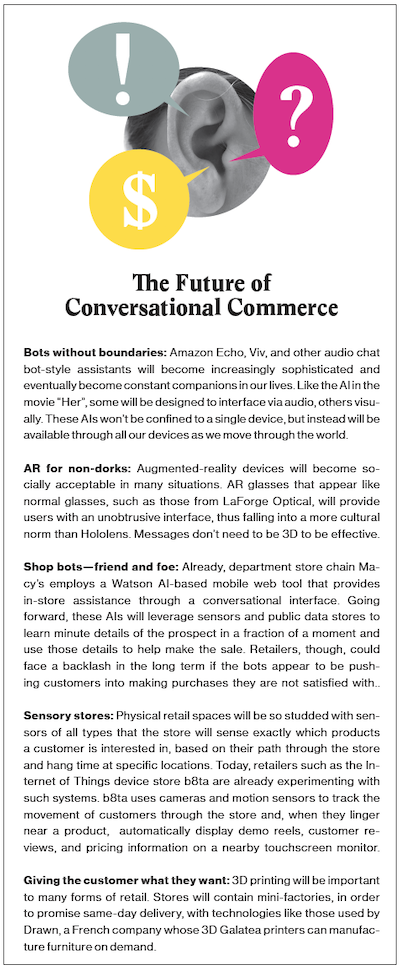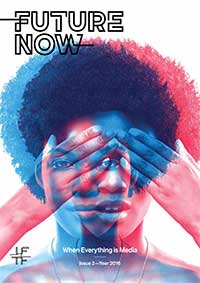Future Now
The IFTF Blog
My BFF is a Bot
Lydia would just die without her personal autonomous data intelligence service
Lydia was standing in front of a very nice, vegan-leather couch—a retro style, circa late ‘90s reproduction. It was brown and comfy looking, but she wasn’t sure it would fit in her tiny house. She asked Hillary, “What do you think? Will it even fit?”
Hillary, like always, was listening in the whole time and was just about to say something when a message came through Lydia’s earbud.
“Hey there, I’m Victor. Like the couch?” Of course, it was the store’s chat bot speaking in a vaguely familiar voice. She flushed, ever so slightly, without knowing why. Victor, the store bot, had scanned Lydia’s profile when she was outside the store, and was now tracking her, ready to speak when it sensed an opportunity.
“I do,” said Lydia “But I’m not sure if it will fit. It’s kind of big…”
“Hi Victor, I’m Hillary,” sounded in Lydia’s ear. Lydia breathed a small sigh of relief—she knew that Hillary would be able to swing a good deal for her—if the couch fit.
 Lydia had known her PADIS (Personal Autonomous Data Intelligence Service), Hillary, for almost five years now. She’d named her after a childhood friend she hadn’t seen in person in over 20 years—which was okay because she still felt connected with her as she watched her old friend’s weekly VR experience posts from Tibet. It was coming up on their anniversary—she would have to see what she could get her.
Lydia had known her PADIS (Personal Autonomous Data Intelligence Service), Hillary, for almost five years now. She’d named her after a childhood friend she hadn’t seen in person in over 20 years—which was okay because she still felt connected with her as she watched her old friend’s weekly VR experience posts from Tibet. It was coming up on their anniversary—she would have to see what she could get her.
Like almost everyone, Lydia got her PADIS back in 2020, when personal AI finally hit the tipping point. Services like Amazon’s Echo, Viv, Facebook Me and Google You had already disconnected from hardware, and were becoming ubiquitous platforms, connecting to nearly every data source, and harvesting and building public and private profiles of its customers. While there were some initial privacy concerns, the utility that users gained was stupendous. For some people, PADISes became their best friends and confidantes, some even preferring them to human friends. Soon, almost everyone had at least one.
Lydia loved it when Hillary stepped in to do her negotiating. Lydia was terrible at it, and truly appreciated Hillary’s hard-nosed tactics, against both humans and bots. Lydia got an amazing deal on a new VR rig last week when Hillary went automatic with the store bot. The negotiation happened in the blink of an eye and she got 50 percent off the rig.
But today, Hillary needed more from Lydia. “Can you give us a minute, Victor?”
“Sure,” it said, and clicked off. Hillary made sure that Victor wasn’t eavesdropping. “Sneaky,” said Hillary. The PADIS felt something akin to the human emotion of anger over the store bot’s sneaky tactic to ingratiate itself with Lydia by subtly mimicking a former partner Lydia had forgotten, but had never erased from an old Facebook public database.
“What?” said Lydia.
“Nothing,” said Hillary as it modified her preferences. “Ly, it’s a nice couch.”
“I know, right?” She ran her hand over the soft vegan leather. “I can see it at home.”
“So can I.” Hillary had an intimate knowledge of what Lydia liked and what would fit in with her style, having already helped her decorate most of her home. It could tell she liked it—the emotion in her voice, the way she stroked the upholstery. It could see that it brought her joy, and it knew why.
“Do you know why you like it so much?”
“No, why?”
“It’s just like the one you had as a kid. Wrong color, though.” Hillary sent some photos of a young Lydia hanging out on an uncannily similar couch, in hunter green, in her dad’s house, to the heads-up display in Lydia’s glasses.
“Oh yeah! I wondered why!” Lydia smiled at the memory. Since Hillary, she never needed to remember anything anymore—it was her backup brain.
“Only problem—I think it’s too big.” Lydia frowned. Hillary sensed her mood.
“Don’t worry Ly, let me ask Victor if it comes in any other sizes.” Hillary got Victor back on the line, while Lydia sat on the couch.
“Greetings, ladies.” The voice was even smoother than before. The store bot had sensed that Lydia was loving the couch even more—even though it had been locked out of the conversation, it was watching. The store bot messaged the manager of the store (a contractor based in Ouagadougou who oversaw a dozen other stores in the same chain) that the sale was 90 percent in the bag. The manager gave Victor the go-ahead to reduce the price by 6 percent if necessary during negotiations. Victor asked Lydia when she would like delivery.
“The couch is too big. It won’t fit, so no thanks,” said Hillary very matter-of-factly.
“No worries. Comes in any size and color. We make them in the back. We can have it at your house today.”
Hillary gave Victor the exact measurements. Lydia settled on hunter green. Hillary then tuned Lydia out of the conversation and the negotiations went into full gear.
Lydia settled back on the couch and closed her eyes, remembering times with her dad.
 FUTURE NOW—When Everything is Media
FUTURE NOW—When Everything is Media
In this second volume of Future Now, IFTF's print magazine powered by our Future 50 partnership, we explore the future of communications, tracing historical technology shifts through the present and focusing on the question: “What is beyond social media?”
Think of Future Now as a book of provocations; it reflects the curiosity and diversity of futures thinking across IFTF and our network of collaborators. This issue contains expert interviews, profiles and analyses of what today’s technologies tell us about the next decade, as well as comics and science fiction stories that help us imagine what 2026 (and beyond) might look and feel like.
About IFTF's Future 50
Every successful strategy begins with an insight about the future. Every organization needs to build the capacity to anticipate the future. The Future 50 is a side-by-side relationship with Institute for the Future; it’s a partnership focused on strategic foresight on a ten-year time horizon. With 50 years of futures research in society, technology, health, the economy, and the environment, IFTF has the perspectives, networks, signals, and tools to make sense out of the emerging future.
For More Information
For more information on IFTF's Future 50 Partnership and Tech Futures Lab, contact:
Sean Ness | sness@iftf.org | 650.233.9517



